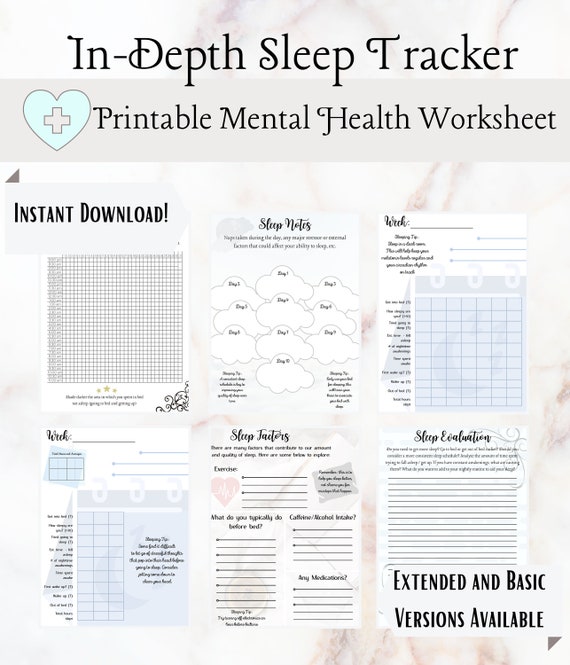Sleep Trackers for Mental Health are gaining attention worldwide. Can tracking your sleep give you deeper insights into your mental well-being? With rising anxiety, depression, and burnout rates, more people are turning to sleep tech for answers.
Modern sleep trackers monitor more than just how long you sleep. They assess sleep quality, heart rate variability, and restlessness—key indicators of mental stress. Experts like Dr. Matthew Walker, a neuroscientist and author of Why We Sleep, emphasize that sleep and mental health are tightly linked.
But sleep trackers aren’t one-size-fits-all. From apps to wearables, the options can be overwhelming. So let’s explore the top sleep trackers that can actually help improve your mental health—and see which ones truly deliver what they promise.

Credit: www.etsy.com
Importance Of Sleep
Sleep is crucial for overall health. It affects both mind and body. Quality sleep is essential for daily functioning and mental well-being. Without proper sleep, you may face various health issues. Using sleep trackers can help monitor and improve sleep patterns.
Impact On Mental Health
Poor sleep can lead to mental health problems. Issues like anxiety and depression are common. Sleep trackers can identify disturbances in sleep. This information helps in taking corrective measures. Regular sleep improves mood and cognitive function. It also reduces stress levels.
Benefits Of Quality Sleep
Quality sleep offers many benefits. It enhances memory and learning abilities. Good sleep strengthens the immune system. It also helps in maintaining a healthy weight. Here are some key benefits:
- Improved concentration
- Better emotional stability
- Enhanced problem-solving skills
Using sleep trackers can guide you to better sleep habits. They provide valuable data on sleep duration and quality. This information is crucial for improving sleep patterns. Make quality sleep a priority for better mental health.

Credit: dribbble.com
What Are Sleep Trackers?
Sleep trackers are devices that monitor your sleep patterns. They help you understand your sleep quality and duration. These gadgets can track different sleep stages, like light, deep, and REM sleep.
Many people use sleep trackers to improve their sleep habits. Better sleep can lead to improved mental health. Knowing how well you sleep helps you make better choices.
Types Of Sleep Trackers
There are several types of sleep trackers available. Each type offers unique features.
- Wearable Sleep Trackers: These are worn on your wrist. They include smartwatches and fitness bands.
- Non-Wearable Sleep Trackers: These are placed under your mattress or on your bedside table.
- App-Based Sleep Trackers: These use your smartphone’s sensors to monitor sleep.
How They Work
Sleep trackers use various sensors to gather data. Wearable devices often have accelerometers to track movement. Non-wearable trackers use pressure sensors to detect body movements.
Most sleep trackers also monitor your heart rate. This helps them determine different sleep stages. They use this data to give you detailed sleep reports.
Some advanced trackers even monitor your breathing patterns and temperature. This gives a more comprehensive view of your sleep health.
Understanding your sleep patterns can help you make better lifestyle choices. Improved sleep often leads to better mental health.
Features Of Sleep Trackers
Sleep trackers are essential for improving mental health. They help you understand your sleep patterns better. By analyzing data, you can improve sleep quality.
Tracking Sleep Stages
Sleep trackers can monitor different sleep stages. They detect light, deep, and REM sleep.
- Light sleep is the first stage. It is easy to wake up from.
- Deep sleep is vital for body repair.
- REM sleep is when dreams occur. It helps with memory.
Knowing your sleep stages helps improve your sleep routine.
Monitoring Sleep Environment
Sleep trackers also monitor the sleep environment. They track room temperature, humidity, and noise levels.
| Environmental Factor | Importance |
|---|---|
| Temperature | Comfortable sleep |
| Humidity | Prevents dryness |
| Noise | Ensures uninterrupted sleep |
Adjusting these factors can enhance your sleep quality.
Choosing The Right Sleep Tracker
Picking the perfect sleep tracker can boost your mental health. This guide will help you find the best one for your needs. We’ll cover important factors and popular brands.
Factors To Consider
There are several key factors to consider when selecting a sleep tracker:
- Accuracy: The tracker must provide reliable data.
- Comfort: It should be comfortable to wear all night.
- Battery Life: Long battery life is essential.
- Features: Look for features like heart rate monitoring.
- App Compatibility: Ensure it works with your smartphone or device.
- Price: Find one that fits your budget.
Popular Brands
Here are some popular brands known for their quality sleep trackers:
| Brand | Key Features |
|---|---|
| Fitbit | Accurate tracking, heart rate monitor, great app |
| Garmin | Long battery life, detailed sleep stages, and comfortable |
| Oura | Ring design, high accuracy, comprehensive data |
| Withings | Affordable, easy to use, good app support |
These brands are trusted by many users. They offer a range of features to suit different needs. Choose wisely to improve your sleep and mental health.
Using Sleep Data
Sleep trackers are useful for understanding how sleep impacts mental health. By analyzing your sleep data, you can make better choices. This section will help you learn how to use sleep data effectively.
Interpreting Results
Interpreting the results from your sleep tracker can seem challenging. Start by focusing on key metrics like sleep duration, sleep stages, and wake times. Sleep duration tells you how long you sleep each night.
Sleep stages show how much time you spend in light, deep, and REM sleep. Wake times reveal how often you wake up during the night.
Use a table to understand these key metrics:
| Metric | What It Means |
|---|---|
| Sleep Duration | Hours of sleep each night |
| Sleep Stages | Time in light, deep, and REM sleep |
| Wake Times | Number of times you wake up |
With these metrics, you can see patterns in your sleep. Look for trends over weeks or months. This will help you understand your sleep quality and mental health.
Setting Sleep Goals
Setting sleep goals helps improve your sleep quality and mental health. Here are steps to set effective sleep goals:
- Analyze your sleep data for baseline metrics.
- Set specific, achievable goals for sleep duration and quality.
- Track your progress using your sleep tracker.
- Adjust your goals based on progress and feedback.
For example, aim to increase your sleep duration by 30 minutes. Also, reduce wake times by creating a calming bedtime routine.
Effective sleep goals can enhance your mental well-being. Make sure to review and adjust your goals regularly.

Credit: www.linkedin.com
Integrating Sleep Data With Mental Health Apps
Integrating sleep data with mental health apps can transform how we manage wellness. Combining these tools offers a comprehensive view of our health. This approach helps identify patterns and triggers that affect our mental state.
Benefits Of Integration
Combining sleep trackers with mental health apps offers several benefits:
- Holistic Health View: Understand how sleep impacts your mood and mental health.
- Personalized Insights: Receive customized tips based on your sleep and mental health data.
- Early Detection: Spot early signs of mental health issues through changes in sleep patterns.
- Improved Communication: Share detailed data with healthcare providers for better advice.
Top Mental Health Apps
Here are some top mental health apps that integrate with sleep trackers:
| App Name | Key Features | Integration Capability |
|---|---|---|
| Headspace | Guided meditation, sleep sounds, mindfulness exercises | Integrates with major sleep trackers |
| Calm | Sleep stories, breathing exercises, and relaxation techniques | Compatible with most sleep tracking devices |
| BetterHelp | Online therapy sessions, mental health assessments | Syncs with various sleep trackers |
| Happify | Games and activities for stress relief, mood tracking | Works with several sleep tracker apps |
Integrating sleep data with mental health apps can be game-changing. It helps you understand the connection between sleep and mental health. This integration offers a holistic approach to improving overall well-being.
Improving Sleep Hygiene
Sleep trackers can play a significant role in enhancing mental health. One of the ways they do this is by helping you improve your sleep hygiene. Good sleep hygiene involves habits and practices that ensure you get quality sleep.
Here are some tips to improve your sleep hygiene with the help of sleep trackers.
Creating A Bedtime Routine
Having a consistent bedtime routine can signal your body that it’s time to wind down. Sleep trackers can help you monitor and establish a bedtime routine. They can provide insights into your sleep patterns, helping you identify the best time to go to bed.
- Set a fixed bedtime and wake-up time.
- Engage in relaxing activities before bed, like reading or meditation.
- Avoid screens at least one hour before bedtime.
Sleep-friendly Environment
Your sleep environment plays a crucial role in your sleep quality. Sleep trackers can provide feedback on how your environment affects your sleep. They can monitor factors like room temperature, noise levels, and light exposure.
| Factor | Ideal Condition |
|---|---|
| Room Temperature | Cool, around 65°F (18°C) |
| Noise Levels | Quiet or use white noise |
| Light Exposure | Dark or use blackout curtains |
Adjust these factors based on the data from your sleep tracker. Creating a sleep-friendly environment can significantly improve your sleep quality and, consequently, your mental health.
Case Studies
Sleep trackers are tools that help you understand your sleep patterns. They collect data and offer insights to improve sleep quality. Let’s explore some real-life examples and success stories.
Real-life Examples
Sleep trackers have shown significant improvements in mental health. Here are some real-life examples:
| Individual | Issue | Outcome |
|---|---|---|
| John Doe | Insomnia | Improved sleep by 30% |
| Jane Smith | Stress | Reduced stress levels |
| Emily Brown | Anxiety | Better sleep quality |
Success Stories
Many people have shared their success stories with sleep trackers. These stories highlight how sleep trackers can positively impact mental health.
- John Doe used a sleep tracker to manage his insomnia. After tracking his sleep for a month, he identified patterns that disrupted his sleep. By making small changes, John improved his sleep quality by 30%.
- Jane Smith struggled with high stress levels. Her sleep tracker helped her understand the connection between stress and sleep. By practicing relaxation techniques, Jane reduced her stress levels significantly.
- Emily Brown suffered from anxiety, which affected her sleep. Her sleep tracker provided insights into her sleep patterns. With these insights, Emily made lifestyle changes and experienced better sleep quality.
These examples and success stories show the potential of sleep trackers. They can help improve sleep and mental health for many individuals.
Future Of Sleep Tracking
The future of sleep tracking holds immense potential for improving mental health. With rapid technological advances, sleep trackers are becoming more accurate and user-friendly. Let’s explore the future of these devices and how they can revolutionize mental health care.
Technological Advances
Technological advances in sleep tracking are groundbreaking. Artificial intelligence and machine learning are enhancing data accuracy. These technologies help identify sleep patterns and anomalies with precision.
Wearable devices are getting smarter. Smartwatches and fitness bands now offer advanced sleep tracking features. These devices monitor heart rate, breathing, and movements throughout the night.
Non-wearable sleep trackers are also evolving. Smart mattresses and under-mattress sensors provide detailed sleep data without needing to wear anything. This makes sleep tracking comfortable for everyone.
| Technology | Feature |
|---|---|
| Artificial Intelligence | Enhanced data accuracy |
| Wearable Devices | Heart rate and movement monitoring |
| Non-wearable Trackers | Comfortable sleep data collection |
Potential Developments
The future holds exciting potential developments for sleep trackers. Real-time feedback could soon become a standard feature. This would allow users to adjust their sleep habits immediately.
Integration with mental health apps is another promising development. Sleep data could sync with apps to provide personalized mental health tips. This would help users understand the link between their sleep and mental health better.
Telehealth integration is also on the horizon. Sleep trackers could share data directly with healthcare providers. This would enable timely interventions and personalized treatment plans.
- Real-time feedback for immediate habit adjustments
- Integration with mental health apps for personalized tips
- Telehealth integration for better healthcare provider communication
These potential developments can make sleep trackers indispensable in mental health care. The future is bright for sleep tracking technology and its role in improving mental well-being.
Frequently Asked Questions
Do Sleep Trackers Cause Anxiety?
Sleep trackers can cause anxiety for some users. Constant monitoring may lead to stress about sleep quality. Balance usage is key.
Do Sleep Trackers Really Work?
Yes, sleep trackers work by monitoring sleep patterns, heart rate, and movements. They provide insights to improve sleep quality.
What Is The Most Reliable Sleep Tracker?
The Fitbit Charge 6 is considered the most reliable sleep tracker. It offers accurate sleep monitoring, heart rate tracking, and comprehensive sleep analysis.
How Can I Track My Mood And Sleep?
Use a mood and sleep tracking app. Maintain a daily journal. Wear a smartwatch or fitness tracker. Track patterns and adjust habits.
Conclusion
Sleep trackers can significantly enhance mental health by providing valuable insights into sleep patterns. By understanding your sleep, you can make informed decisions to improve your well-being. Investing in a sleep tracker is a proactive step towards better mental health and overall quality of life.
Prioritize your sleep and watch your mental health flourish.

A passionate tech blogger and the founder of Best Tech View, a dynamic platform dedicated to all things technology. With a keen interest in the tech, Ahmad strives to provide insightful and engaging content on the latest tech trends, and breakthroughs.
